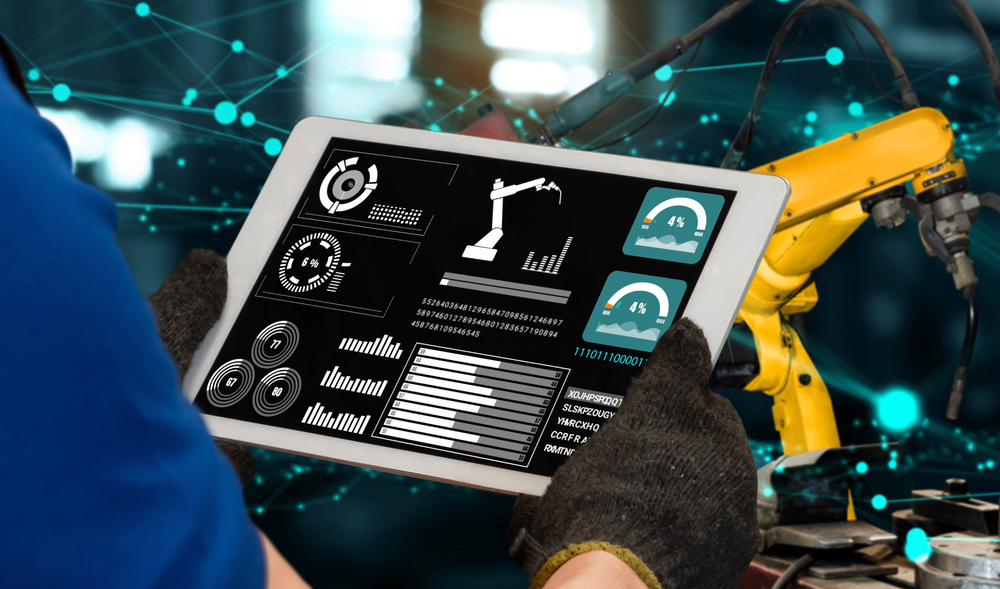Industry 4.0 is changing manufacturing as we know it. And it’s becoming increasingly obvious that digital transformation and intelligent automation has become a necessity for supply chains and manufacturers if they want to keep up with competition.
One of the most significant advancements in this domain is the emergence of smart factories. These cutting-edge production facilities leverage advanced automation, data analytics, and interconnected systems to optimise operations, enhance productivity, and improve overall quality control.
What is a smart factory?
A smart factory refers to a fully integrated and digitised manufacturing environment that leverages the power of automation, artificial intelligence (AI), the Internet of Things (IoT), and real-time data analytics to enable seamless and efficient production processes. Smart factories connect the digital and physical world in order to monitor the entire production process, from supply chain management to manufacturing tools and even the work of individual operators on the shop floor.
This empowers manufacturers to optimise operations, enhance productivity, minimise waste, and improve decision-making through the interconnectedness of machines, systems, and people.
The key components of a smart factory
Intelligent automation
Smart factories employ advanced automation technologies, such as robotics, to streamline repetitive tasks and improve efficiency. These robots are equipped with sensors and AI algorithms that allow them to perform complex tasks with precision and adaptability.
Internet of Things (IoT)
The IoT forms the backbone of smart factories, enabling the seamless connectivity of machines, devices, and systems. IoT sensors gather real-time data, providing insights into various aspects of production, including equipment performance, energy consumption, and product quality.
Big data analytics and Artificial Intelligence (AI)
Smart factories harness the power of data analytics and AI algorithms to extract valuable insights from the vast amounts of data generated within the manufacturing process. This data-driven approach enables predictive maintenance, optimised inventory management, and improved quality control.
Digital twin technology
Digital twin technology creates virtual replicas of physical assets and processes, allowing manufacturers to simulate and optimise production scenarios. By analysing the digital twin, manufacturers can identify bottlenecks, test new ideas, and make informed decisions to improve efficiency and quality. Find out more about our work on digital twin technology with OX.
How does FLAGS support the smart factory?
FLAGS quality management software builds the foundations of smart quality control. Our software allows you to review data and feedback at every stage of production to maintain standards of quality and execution.
When manufacturers embrace the power of FLAGS Software, they can build an unparalleled smart factory. We integrate machines, people and big data into one digitally connected ecosystem to not only monitor but to also analyse and learn from.
FLAGS integrations include barcode scanners, cameras, metrology devices and other digitalised production equipment in various parts of the operation and interconnect them. This removes the risk of people and systems working in silos, as people and machines are constantly sharing information and working together.
By leveraging advanced analytics, predictive modelling, real-time monitoring, machine learning, and continuous improvement techniques, this empowers businesses to identify and address quality issues proactively, optimise processes, and achieve unparalleled levels of quality excellence in manufacturing.
What are the benefits of a FLAGS smart factory?
Improved efficiency
FLAGS smart factory optimises resource allocation, minimises downtime, and reduce waste by automating processes, tracking real-time data, and streamlining operations. This frees up time for employees, giving them the opportunity to focus on other value adding tasks, which leads to increased productivity, reduced costs, and improved overall efficiency.
Smarter quality control
Quality control plays a vital role in manufacturing, and smart factories take this to the next level. Real-time data monitoring and analysis through FLAGS Software enables early detection of defects, ensuring timely corrective actions and reducing the likelihood of faulty products reaching customers.
Flexibility and customisation
The FLAGS smart factory offers a high degree of flexibility, enabling manufacturers to quickly adapt to changing customer and economic demands. With the ability to reconfigure production lines and adjust processes in real-time, manufacturers can efficiently cater to custom orders and stay competitive in dynamic markets.
Employee empowerment
Human beings will always remain essential in manufacturing – whilst automation can take over certain tasks and plays a significant role in automation, it won’t replace people. Smart factories empower employees by automating time consuming tasks, allowing them to focus on more value-added activities like quality assurance, problem-solving, and innovation.
Complete digital workflows
With data input being done through our touch screen systems, smart factories reduce the need for paper-based documents, creating a level of responsiveness and operational transparency that’s difficult to achieve otherwise. When data is input and shared across each process, it allows for efficient data acquisition and coordination.
Data-driven decision making
Smart factories ensure that accurate data from various sensors and equipment is collected in real time, and site wide reporting becomes the norm. Through machine learning and AI, data is shared and stored in data warehouses, which can then be used to drive data driven decision making.
How can smart factories improve quality control?
Smart factories are driving the manufacturing industry’s evolution, and quality control stands as a crucial pillar of their success. As technology continues to advance, we can expect further improvements in quality control within smart factories.
Predictive analytics, machine learning, and AI will enable manufacturers to anticipate and prevent quality issues before they occur, resulting in higher customer satisfaction and reduced product recalls.
In tandem, this will also enhance traceability and transparency throughout the supply chain, which will enable manufacturers to maintain stringent quality standards.
If you’re ready to take the next step toward quality innovation, get in touch with FLAGS Software. Together, we can shape a future where quality excellence becomes the norm rather than the exception in manufacturing.




Merry Christmas to you all.
Kind regards
Rob